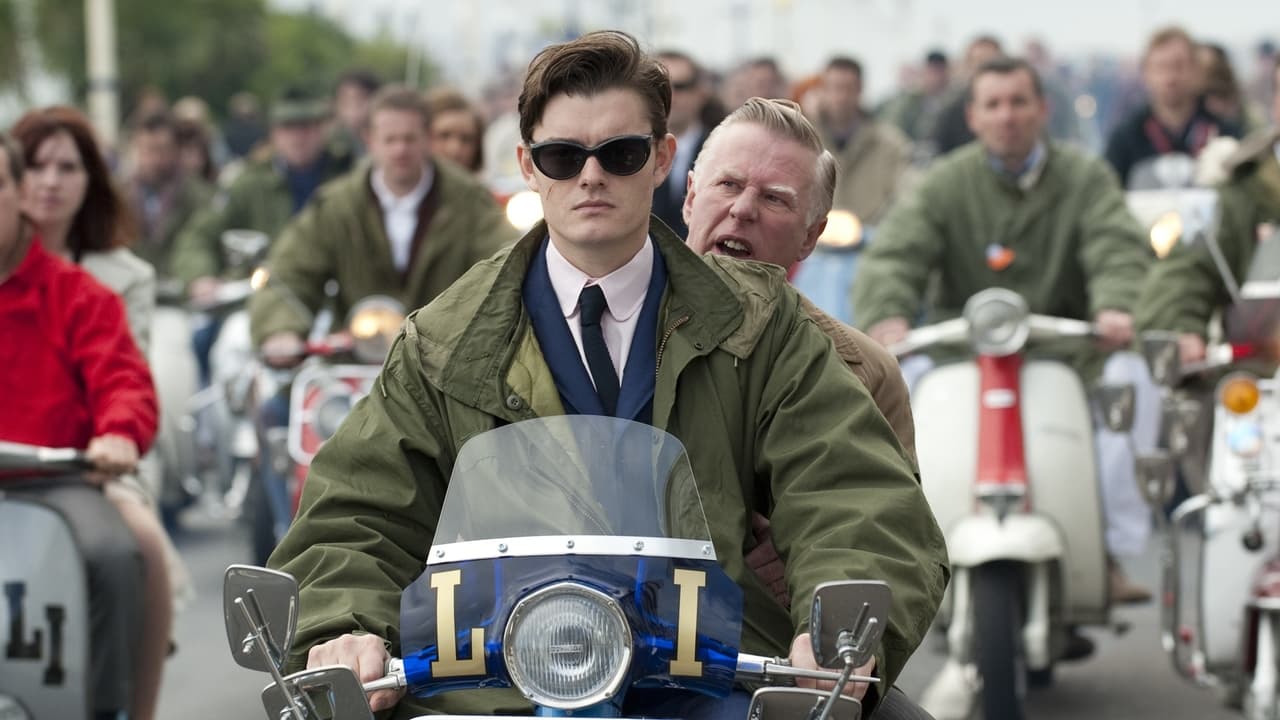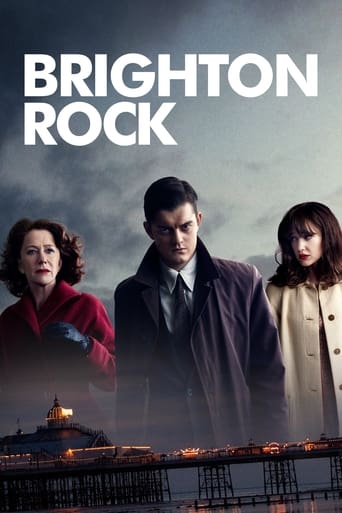

Instant Favorite.
... View Morebrilliant actors, brilliant editing
... View MoreIt’s not bad or unwatchable but despite the amplitude of the spectacle, the end result is underwhelming.
... View MoreTrue to its essence, the characters remain on the same line and manage to entertain the viewer, each highlighting their own distinctive qualities or touches.
... View MoreIt appears that this film divides as people seem to hate it because it's a remake or you just love it like me who had never seen the original film before. I thought that this film is a return to the old ways of making films with style and good score. It's got that classical style in it and it appears that the makers have really put an effort in studying the old films. The music is used like they did in the old "gialli" films. That's just a perfect way to get me hooked completely even if the film wasn't that good. This movie is better than good and i can recommend it to those who prefer slower pace in films and perfect acting and good script.
... View MoreSometimes it's a character you liked that attracts, like the role Philip Davis played in Midsomer Murders. Other times it's to see a great star like Helen Mirren.Whatever the reason, it's always good to see a film based on a Graham Greene novel, like The Third Man, This Gun for Hire, The Quiet American, and many more.A young Richard Attenborough played in this movie in the 40's, here is falls to Sam Riley (Control, Maleficent) to play the lead. He is capably assisted by Andrea Riseborough (Oblivion, Shadow Dancer), as the waitress he marries to keep her from testifying as a witness.A good neo-noir with contributions from William Hurt and Nonso Anozie (The Grey, Game of Thrones).
... View MoreEvidently in order to simplify the plot, this version of BRIGHTON ROCK starts off on the wrong foot and never regains its balance. The start of the book (and of the 1947 movie) shows us the murder of an innocent man. An impecunious, promiscuous middle-aged woman with an innate sense of justice refuses to let the murder go unsolved. In this new movie, the murder victim is a violent thug and the middle-aged woman is a friend of his, so the pure and disinterested quest for justice is muddied up by the woman's personal motivation and the victim's own culpability. Moreover, she isn't wanting for money, so her quest for justice, while still dangerous, is less quixotic.There is also a problem with the young gang leader and his girlfriend. The book contains certain extremes of characterization that the movie might indeed be excused for avoiding, especially in the 21st century. The gang leader is supposed to be in his mid-teens, while his gang members are adults, and if that were on the screen before your eyes it would be harder to believe than in a book. Still, although both movies used actors out of their teens, this time the fellow scarcely looks boyish; he's balding deep at the temples. And his girlfriend in the movie makes less of an effort than in the book to turn her attention away from his evildoing. It's understandable that a movie in 2010 would not want her portrayed as hiding her head in the sand; but by reducing her naiveté, as in taking away the innocence of that murder victim at the beginning, the movie becomes more a tale about those other people, the criminals who are unlike you and me, and less a story where we can find people to identify with.
... View MoreOne of the perils of remaking a classic film is that your version will be compared unfavourably with the original. Of course, there have always been film-makers who have dared to brave this peril, and it is as well that there have been, otherwise we would have been deprived of, for example, Kenneth Branagh's interpretation of "Henry V", which spoke to the eighties just as Laurence Olivier's had spoken to the forties.Graham Greene's novel "Brighton Rock" was famously adapted for the screen by the Boulting brothers in 1947, and their version is widely regarded as one of the greatest films from the "Golden Age" of the British cinema during the forties and fifties. Rowan Joffé's recent remake has not been universally well-received, particularly by those who believe that nothing can ever compete with its illustrious predecessor. Much as I admire the Boultings' film, however, I have to admit that the newcomer has many virtues of its own.The main character is Pinkie Brown, the youthful leader of a gang of thugs whose principal activity is protection racketeering. Early in the film, Pinkie murders Hale, a member of a rival gang, in revenge for the murder by Hale of Pinkie's colleague Kite. (In the original novel and the 1947 film, Hale was a journalist who had been investigating the gang's activities. Another change is the date at which the story takes place; although the novel and original film are both set in the 1930s, this adaptation is set during the Mods and Rockers era of the 1960s).Pinkie tries to cover his tracks by creating a false alibi for himself, which leads to the commission of further crimes and to Pinkie's marriage to Rose, a young waitress who he believes might be in possession of evidence which could send him to the gallows. Pinkie is not in love with Rose, but marries her because at the time the film is set there was a rule of English law that a wife could not give evidence against her husband. The ending is closer to the one Greene wrote in his novel, although Joffé keeps the famous twist which the writer introduced when he produced the 1947 screenplay.Joffe said that he made the film because, on reading the novel, he "fell absolutely in love with the character of Rose", and the treatment of this character is, in my view, the one area in which the modern film is better than the earlier one. Andrea Riseborough's interpretation of the character- downbeat, dowdy, bespectacled and needy- seems just right for the role. Rose responds to Pinkie's overtures because he is the only person to have shown her any affection, and she is naïve enough to overlook his obvious criminality and not to realise that his affection for her is feigned. Carol Marsh's Rose, however, was rather too glamorous; it was difficult to imagine her as someone lacking in male admirers.There are also good performances from two veterans of the British cinema, John Hurt and Helen Mirren. Hurt plays the bookmaker Phil Corkery, who has a more important role in this adaptation than he does in the book. Mirren plays Ida Arnold, the woman whose determination to get at the truth results in Pinkie's downfall. In the 1947 Ida was played by Hermione Baddeley as a blowsy, ageing showgirl and a casual acquaintance of Hale; here she becomes the manageress of the café where Rose works and a close friend of the murdered man.I was less impressed by Sam Riley who, as Pinkie, lacked the sense of menace and evil which Richard Attenborough brought to the role. At 30, moreover, Riley seemed too old to play a teenager. (Attenborough would have been 24 in 1947, and looked younger). Also, I couldn't see the point of setting the story in the 1960s, as the "Mods and Rockers" element added little, or nothing, to Greene's story. Pinkie's gang, and the rival Colleoni gang, were both part of Brighton's own criminal underworld, whereas the Mods and Rockers were drawn from all over the country, especially London, and merely chose Brighton, and other seaside resorts, as convenient places for their battles.Joffé has also discarded a lot of the religious content of the original novel. Greene made Ida an atheist whose system of values was based upon secular ideas of "right" and "wrong", as opposed to Pinkie and Rose, both believing Catholics who believed firmly in "good" and "evil". This opposition between two contrasting attitudes to morality was an important theme of the novel, but it is not something dwelt on at length in either film. The 1947 version downplayed Pinkie's religious beliefs, possibly as a concession to Catholics unhappy with the idea of one of their flock being portrayed as a violent criminal, although it did concentrate on Rose's spiritual development. The modern film acknowledges that both Pinkie and Rose are "Romans", but for the most part avoids theological issues and turns Greene's story into the basis for a grim, grey neo-noir type crime thriller. (The 1947 film was set during a sunny summer Bank Holiday; this version appears to have been shot in winter, with Brighton largely deserted by holidaymakers). It is up to the viewer to decide which approach he or she prefers. 7/10
... View More